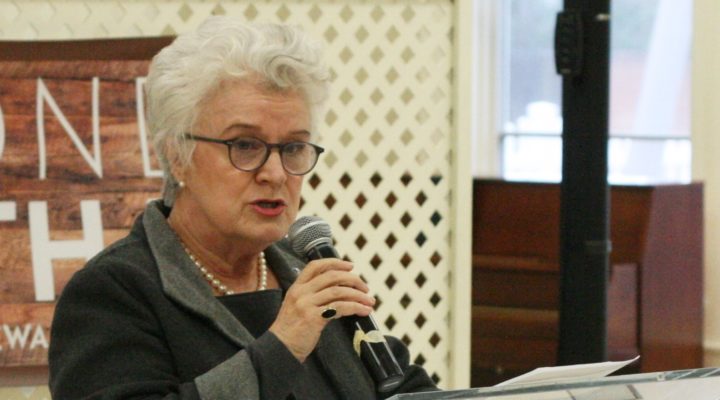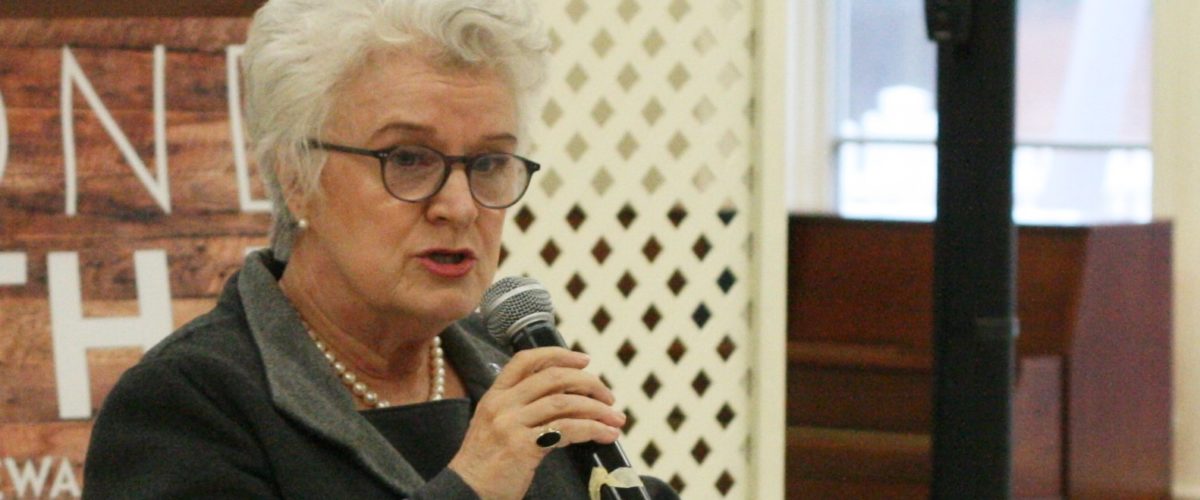The Baptist Theological Seminary at Richmond – the first free-standing seminary started as an alternative to the six Southern Baptist Convention seminaries during a schism in the late 20th century – is closing its doors at the end of the current academic year.
The Virginia seminary, one of 15 theological institutions that receives funding from the Cooperative Baptist Fellowship, announced Nov. 13 it will close June 30, 2019, “due to financial pressures.”
Established by vote of the Southern Baptist Alliance – later renamed Alliance of Baptists – in 1989, the seminary opened for classes in the fall of 1991 after the president and dean at Southeastern Baptist Theological Seminary in Wake Forest, North Carolina, chose to resign rather than implement restrictive hiring policies of the board of trustees.
Southeastern was the first SBC institution to feel full effect of the “conservative resurgence,” a political campaign launched in 1979 to reverse trends that the movement’s leaders warned would eventually lead the nation’s largest Protestant body to join the ranks of declining mainline denominations they perceived as departing from the fundamentals of Christianity.
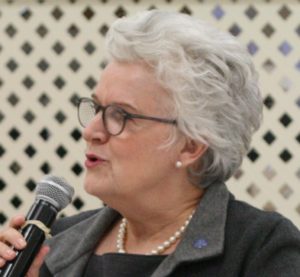
Linda Bridges breaks news of BTSR’s closing to alumni. (Photos by Bob Allen)
BTSR opened with a mission statement declaring itself “unmistakably Baptist” but with a commitment to being “racially and gender inclusive with an ecumenical commitment and a global perspective.” Three decades later, 750 graduates serve as pastors, chaplains, missionaries and nonprofit leaders round the world.
President Linda McKinnish Bridges announced the closure at a joint meeting of BTSR alumni and friends and Cooperative Baptist Fellowship of Virginia held in conjunction with the Nov. 12-13 annual meeting of the Baptist General Association of Virginia. “To our staff, to our faculty, to our trustees, to our students. both past and current, the first word is gratitude,” Bridges said. “The first word is thanksgiving for a life well lived for almost 30 years.”
With the announcement, BTSR joins a number of theology schools that have closed or cut back during the last two decades as seminaries compete for a shrinking pool of prospective students.
Fuller Theological Seminary, the country’s largest multidenominational seminary, recently announced plans to sell its 70-year-old campus in Pasadena, California, and move to a new location designed to expand online education offerings in the wake of shifting enrollment.
Andover-Newton Theological School, affiliated with American Baptist Churches USA and the United Church of Christ and founded in 1807, sold its campus outside Boston in 2017 and formally affiliated with Yale Divinity School in Connecticut.
Episcopal Divinity School stopped granting degrees in June 2017 and affiliated with Union Theological Seminary in New York City, laying off the entire faculty.
“The first word is thanksgiving for a life well lived for almost 30 years.”
“The past decade has been challenging, as some of you know, for churches, for denominations, for divinity schools,” Bridges said. “Decreased giving from supporting entities and a shrinking population of prospective students have stressed schools financially. As a result, many have been pushed to close, merge or innovate.”
Bridges said BTSR intends to maintain its class schedule through the end of this academic year, and the class of 2019 will receive degrees from BTSR. Seminary staff will help other students transfer credits to another school.
BTSR’s two partners in the Richmond Theological Consortium – Union Presbyterian Seminary and the Samuel DeWitt Proctor School of Theology at Virginia Union University – stepped up by offering to help students transfer a maximum number of courses. Trustees are also putting plans in place to address the needs of faculty and staff.
The move affects 55 students who will have to finish their degrees elsewhere, four full-time faculty and three full-time and four part-time staff, according to Beth McMahon, director of communications. Nine students are on track to graduate in 2019.
“I say this from the bottom of my heart, because I was there at the founding of the school, that none of us would have chosen for our students to have to deal with this disruption,” Bridges said. “None of us would have chosen for our faculty and staff to have to deal with this disruption, but we are filled with gratitude and filled with a sense of thanksgiving that the Richmond Theological Consortium partners stand ready to help our students, assist our faculty and staff.”
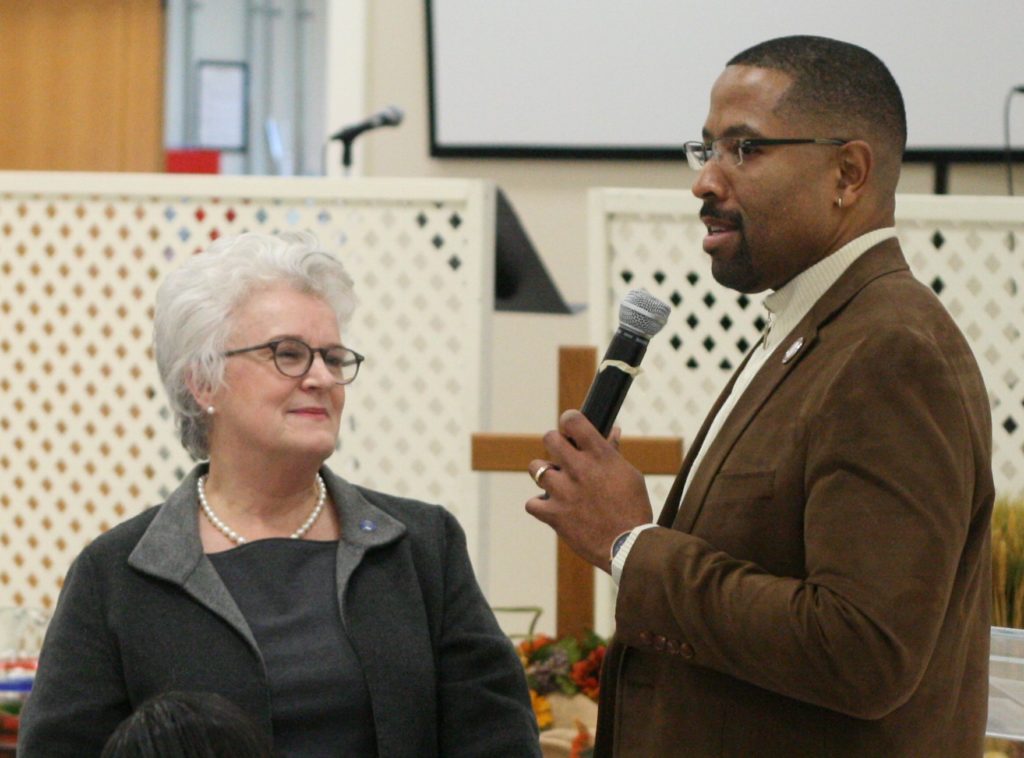
Corey Walker, dean of the Samuel DeWitt Proctor School of Theology at Virginia Union University, shares plans to carry on BTSR’s legacy through a new center to foster racial justice.
To that end, BTSR trustees initiated formation of a new Center for Faith, Justice and Reconciliation, a “resource and convening center” focused on racial justice and innovation in the church. While the center will not grant degrees, Bridges said “it will carry forward the vision fully formed in 1991 that animated the beginnings of BTSR.”
“This type of collaboration grew out of a group of sassy, unconventional, provisional board of trustees that in 1989, as they met in the basement of Northminster Baptist Church, said we must do something different for moderate Baptists,” she said. “And they began to carve out a seminary that interestingly enough would not be in Greenville, South Carolina – although Greenville is a good place – would not be in Decatur, would not be in Nashville, but would be in Richmond, Virginia, and would be located in the middle of a place where there would be racial inclusion and ecumenical hospitality.”
Corey Walker, dean of Samuel DeWitt Proctor School of Theology at Virginia Union University, said his school and BTSR were both “born in oppression.” Established by Northern Baptists to aid newly freed slaves following the Civil War, Virginia Union University did not have its first African-American president until 1940.
BTSR has survived past budget challenges. Its original opening set for 1990 was moved back a year to allow time to raise more funds. In 2008 the school eliminated four of its 13 full-time faculty in a cost-cutting move. In 2011 trustees voted to sell the campus purchased in 1996, and in 2013 the seminary relocated to a more affordable site.
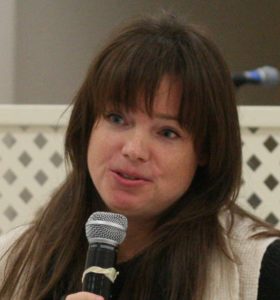
Hannah McMahan
Hannah McMahan, executive director of the New Baptist Covenant who accepted an invitation to address the BTSR/CBF luncheon unaware of the impending decision, testified to the seminary’s impact on her own calling as a pastor’s daughter growing up amid restrictions placed on women in ministry by the Southern Baptist Convention in the 1980s.
“God is never without a witness,” McMahan said. “One of my first witnesses was through BTSR. I remember through CBF learning about people who stood up for women, saying that women are not only capable, but women are chosen by God to speak for God to the world.”
BTSR board chair Bill Wilson said the decision to close did not come lightly. “BTSR has been a valuable and trusted source of theological training for women and men, and we are confident that its positive impact will continue to be felt as its graduates serve churches, organizations and other entities for the cause of Christ,” said Wilson, director of the Center for Healthy Churches and a member of the Baptist News Global board of directors.
Bridges, a member of the founding faculty in 1991, looked back with gratitude on the three decades that BTSR has served moderate Baptists.
“Our trustees yesterday had to make a very hard decision, and in the coming days you can be sure that you will find us a bit teary-eyed, lamenting and sad,” she said. “But we all must admit to one another in our vulnerability at this moment there is a host of things to be grateful for and to arch our vision to what God can do through BTSR.”
Related opinion:

